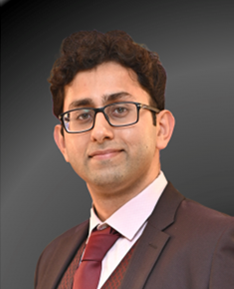Vision for a Low-loss Communication and Powering Interface for Distributed Brain Implants using the Conductive Properties of the TissueBaibhab Chatterjee, PhDAssistant Professor of ECE Tuesday: April 4, 2023
|
 |
Abstract:
Wireless communication using electro-magnetic (EM) fields acts as the backbone for information exchange among wearable devices around the human body. However, for Implanted devices, EM fields incur high amount of absorption in the tissue, while alternative modes of transmission including ultrasound, optical and magneto-electric methods result in large amount of transduction losses due to conversion of one form of energy to another, thereby increasing the overall end-to-end energy loss. To mitigate the challenges of wireless communication in a brain implant with low end-end channel loss, this talk will focus on the recent work on Bi-Phasic Quasistatic Brain Communication (BP-QBC), which utilizes the conductive properties of the human tissues to communicate between implanted nodes and an external wearable device. BP-QBC can work for an implant depth of ~5.5cm, with an implant volume of ~6mm3. This technique uses Electro-quasistatic (EQS) Signaling that avoids transduction losses due to no field-modality conversion. Furthermore, BP-QBC eliminates the need for sub-cranial interrogators/repeaters, as it offers better signal strength due to no field transduction. For powering the implanted nodes, similar EQS techniques or a combination of RF, EQS and magneto-electric techniques could be used . Such low end-to-end channel loss coupled with high data rates (~10Mbps) enabled by a completely new modality of brain communication/powering has deep societal and scientific impact in the fields of neurobiological research, brain-machine interfaces, electroceuticals and connected healthcare.
Speaker Bio:
Baibhab Chatterjee is an Assistant Professor in the Department of Electrical and Computer Engineering (ECE) at the University of Florida, and directs the Wireless Intelligent Sensor Electronics (WISE) Lab. He received his Ph.D. from the Elmore Family School of Electrical Engineering, Purdue University, West Lafayette, IN, USA in 2022. His industry experience includes two years as a Digital Design Engineer/Senior Digital Design Engineer with Intel, India, and one year as a Research and Development Engineer with Tejas Networks, India. He was a Quantum Hardware Design Intern with IBM T.J. Watson Research Center, NY, USA during 2020-2021, where he worked on ultra-low power quantum controller/receiver front-ends.
Baibhab’s research interests include low-power analog, RF, and mixed-signal circuit design for next-generation biomedical applications. He has extensively worked on sending sensor data through the human body channel using the conductive properties of the tissue, for both wearable and implantable applications. As one of his more recent works, he proposed and evaluated bi-phasic quasistatic brain communication (BP-QBC) for distributed brain implants, which will be the focus of this talk.